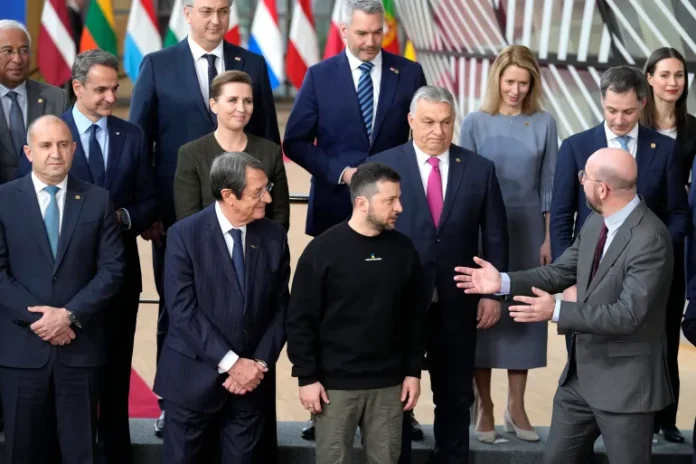Ukraine’s accession to the European Union could have an impact on the bloc’s seven-year budget of 110 to 136 billion euros, Euronews reports.
This would amount to between 0.10 and 0.13 percent of the EU’s gross domestic product (GDP), according to a new report by the Bruegel think tank.
Ukraine was first announced as a candidate in June 2022 and received the go-ahead for accession negotiations in December 2023. To determine how much money the war-ravaged country will be entitled to after gaining the coveted membership, the forecast uses existing rules and the budget structure for 2021-2027.
The conclusions do not take into account the huge reconstruction costs, estimated at a minimum of €450 billion over the next decade, and assume that Ukraine will eventually regain all territory in the east that was lost in the military conflict.
According to Bruegel’s projections, Kyiv will be entitled to:
- 85 billion euros from the Common Agricultural Policy, a massive subsidy package for farmers. As the programme is allocated on a hectare (farmland) basis, Ukraine, with its mighty agricultural sector, will be the largest recipient.
- 32 billion euros from cohesion policy funds, which finances development projects. The distribution of cohesion funds is limited to 2.3 per cent of a Member State’s GDP. Without this restriction, Ukraine would be entitled to around €190bn, six times more.
- EUR 7 billion from other programmes.
During the seven-year budget period, Ukraine will receive about €136 billion (in current prices). This is far less than the €186bn reported by the Financial Times in October, based on a leaked study prepared by the EU Council.
However, if the country continues to see a steady decline in its territory, population and economic resources due to the military conflict, Bruegel estimates that the allocation will drop to €110 billion.
Ukraine’s membership would “hardly change” the ratio between net payers and net beneficiaries of the EU budget, but it would cause a tangible reshuffle in budget allocation. Even if the country manages to recover quickly from the war, it will remain significantly poorer than the EU’s poorest country, Bulgaria, and probably than the Western Balkan countries.
As a result, GDP per capita in the EU will shrink, leading to changes in the distribution of cohesion funds among eligible regions, Zsolt Darvas, a senior researcher at Bruegel and one of the report’s authors, says. In addition, the wealth gap could spur an exodus of three to six million Ukrainians to other European countries in search of higher wages and labour guarantees. Darvas told Euronews:
If the average goes down, then it means that some EU regions which are currently in the lowest category might move up to the transitional regions and some transitional regions might move up to more developed regions. We also find that current EU countries would obtain about €24 billion less from cohesion funding, simply because of the mechanical impact of Ukraine.
Darvas said the budget increase would be “relatively modest” and therefore “doable”, but noted that the projections are purely “hypothetical” as the bloc is expected to rethink its internal rules and decision-making process before expanding further east.
As well as considering the financial implications of Ukraine’s membership, the report also puts forward a number of proposals to ensure a soft landing.
Bruegel recommends that the bloc propose a phased enlargement process that would allow Ukraine to gradually enjoy EU benefits such as the abolition of roaming charges and the ability to pay in euros. This, in turn, would encourage Kyiv to implement the sweeping reforms needed to open all 35 chapters of accession negotiations.
However, Bruegel warns, the transition period conceals a bigger risk: once in the bloc, Ukraine could slip into democratic reforms in an instant, as it did with Hungary and Poland.
Officials in Brussels have spent immeasurable amounts of energy trying to contain the decline of law and order in these two member states, going so far as to freeze EU funds. The protracted standoff has also inspired Brussels to amend the enlargement programme, making the chapter on fundamental rights the first and last to be closed and adding the principle of reversibility, allowing negotiations to end if a candidate reverses its progress.
Darvas recognises that Ukraine’s starting position is “very, very weak” as the country faces poor governance, high levels of corruption and the entrenched influence of oligarchs. The ongoing martial law has changed the balance of power between institutions, and it is still unclear when it will end and what the consequences will be going forward. He said:
The crucial issue is what happens to the rule of law and democracy in Ukraine. This is a difficult task but it primarily depends on Ukraine.
Given Ukraine’s possible U-turn, the authors of the report suggest that the EU innovate and develop new legal provisions that could guarantee fundamental rights before and after accession. These non-standard instruments could be included in the accession treaty that Ukraine would sign with the bloc and ratified by all national parliaments.
This treaty “should include a clause stating that if a country fails to meet certain benchmarks while being a member of the European Union, its voting rights can be suspended much faster than is possible in the EU,” Darvas said, referring to the Article 7 procedure, which has only been invoked against Hungary and Poland but never reached the most radical stages. He added:
Also, access to EU funds could be suspended in a much faster way. So, I think there is a legal option to protect the EU better from the rule of law and corruption backsliding.
